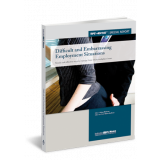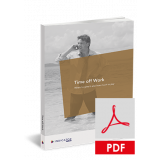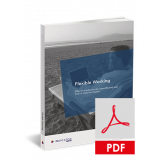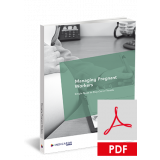6 Special Reports in PDF to manage your staff safely and effectively
Package offer
-
 Managing Part-Time Workers (PDF)
Managing Part-Time Workers (PDF)
-
 Difficult and Embarrassing Employment Situations
Difficult and Embarrassing Employment Situations
-
 Time Off Work
Time Off Work
-
 Flexible Working (PDF)
Flexible Working (PDF)
-
 Safe Employment Contracts (PDF)
Safe Employment Contracts (PDF)
-
 Managing Pregnant Workers (PDF)
Managing Pregnant Workers (PDF)
A Tips & Advice Special Report about...
In a nutshell
In a straightforward way, this Special Report explains the rights of part-time workers and shows how to manage them best. It answers all your questions and highlights the possible pitfalls. You’ll learn how to make the most effective use of part-time workers - all in a legally safe, productive way.
In detail
There are so many legal issues to get right. Slip up with the law and you're likely to find yourself in tribunal. This Special Report helps you safely deal with all the tricky issues surrounding part-time workers, such as:
- Recruitment and contracts
- Calculating annual leave
- Setting up job-share arrangements
- Employees with second jobs
- Dealing with pregnancy
- Full-time to part-time and flexible working requests
- Statutory redundancy pay
Plus, the complementary documents will help you put all the advice into practice.
We've created this Tips & Advice Special Report especially for...
Business owners and managers, HR/personnel managers that want to:
- Know how to get the most from part-time workers
- Deal with part-time workers in a legally safe way
Advisors and consultants that want to:
- Advise their clients on how to best manage part-time workers
You'll get the following free extras with this Tips & Advice Special Report...
An online service with ready-to-use documents
- To immediately apply our advice and solutions in practice
- That you can easily adapt to suit your own requirements
In this Special Report you'll read about...
Part-time workers and the law
Recruitment
Annual leave
Job-share arrangements
Second jobs
Pregnancy issues
Full time to part time
Redundancy
Protecting your business
You can choose from the following options...
Digital
- The PDF-version
- Delivered to your inbox
Take a look at your options below.
A Tips & Advice Special Report about...
In a nutshell
This Special Report explains how to deal with awkward and embarrassing workplace problems. We give pointers on how to approach these problems in a professional and legally safe way that won't take up much of your time.
In detail
Managing your workforce can sometimes be a real nightmare. Just think about all those awkward situations that crop up all the time. This Special Report covers the full range of tricky situations such as bullying, office romances, workplace drug abuse, inappropriate dress, odour problems and even the death of a colleague. For each situation, it provides:
- A brief summary of the issue
- The underlying dangers
- The potential legal pitfalls
- A workable solution
Supported by a series of ready-to-use documents, this Special Report will help you regain control of all those difficult and embarrassing workplace problems.
We've created this Tips & Advice Special Report especially for...
Employers, personnel managers, personnel consultants, company directors that want to:
- Approach tricky workplace issues in a professional and legally secure way
- Retain control and ensure their workers remain productive
Advisors that want to:
- Support their clients in dealing with tricky workplace issues in the right way
You'll get the following free extras with this Tips & Advice Special Report...
An Online Service with ready-to-use documents
- To immediately apply our advice and solutions in practice
- That you can easily adapt to suit your own requirements
In this Tips & Advice Special Report you'll read about...
Table of contents
- How to approach tricky personnel problems
- Older workers who aren’t coping
- Staff refusing to work together
- Conflicting beliefs
- Potential bullying
- When alcohol is an issue
- Smoking cannabis
- Aromatic lunches
- Inappropriate dress
- It’s a bit windy in here
- Fat chance of any work
- Sex in the toilet - it’s so inconvenient!
- The end of an office romance
- Financial worries
- Death of an employee
- Taking further action
- Documents
Agreement for loan repayment
Alcohol and drugs policy
Appraisal procedure and form
Capability procedure
Clear desk policy
Confirmation of no further disciplinary action
Confidentiality agreement
Disciplinary procedure
Dress and appearance policy
Equal opportunities and dignity at work policy
Notification of disciplinary hearing
Notice of disciplinary appeal hearing
Notification of potential dismissal meeting
Opt-out agreement
Opt-out agreement letter
Personal relationships at work policy
Request to attend investigatory meeting
Retirement policy
Sickness absence policy
You can choose from the following options...
Paper
- The hard copy version
- Keep it on your desk or use it whenever you're offline
Digital
- The PDF-version
- Delivered to your inbox
Take a look at your options below.
A Tips & Advice Special Report about...
In a nutshell
This Special Report helps you, as an employer, make sense of the complex rules surrounding time off work. It clearly explains which rights apply and how much you have to pay (if anything). So when time off requests arrive on your desk, you can take action with clarity and confidence.
In detail
Staff can take time off work for a whole host of reasons. Many of these rights come with a minimum entitlement and level of pay. But getting to grips with these ever developing rights can be tricky for any employer.
This Special Report guides you through the risks and helps you decide which route to take. It covers all the common time off work requests:
- Holidays
- Sickness
- Parental and compassionate leave
- Civic duties, public appointments and outside activities
Complemented by a series of ready-to-use documents, this Special Report ensures you're able to handle time off work requests in the best possible way.
We've created this Tips & Advice Special Report especially for...
Business owners and managers, HR/personnel managers that want to:
- Handle time off work requests with clarity and confidence
- Have a better view on what to pay and if there's a right to time off
You'll get the following free extras with this Tips & Advice Special Report...
An online service with ready-to-use documents
- To immediately apply our advice and solutions in practice
- That you can easily adapt to suit your own requirements
In this Tips & Advice Special Report you'll read about...
Holiday pay
Sick pay
Parental payments and compassionate leave
Appointments during pregnancy
Maternity leave and pay
Paternity leave and pay
Shared parental leave and pay
Adoption leave and pay
Emergency leave
Compassionate leave
Parental bereavement leave and pay
Neonatal leave and pay
Contractual parental rights
Civic duties, public appointments and outside activities
Armed forces reservists
Public officials
Emergency services volunteers
Health and safety representatives
Trade union duties
Jury service
Time off during a redundancy notice period
Conclusion
You can choose from the following options...
Digital
- The PDF-version
- Delivered to your inbox
Take a look at your options below.
A Tips & Advice Special Report about...
In a nutshell
This Special Report shows you how to deal with flexible working requests swiftly and efficiently. The right to request flexible working is available to all employees after 26 weeks' service. It's therefore vital that your policies and procedures are up to date and in line with the current rules.
In detail
In easy-to-follow steps, this Report provides full guidance on the procedures you need to follow.
- Types of flexible working
- Criteria to apply for flexible working
- The process for making and handling a request
- What to do when a request is received
- How to respond
- Legally safe rejection grounds
- Using trial periods
- The right of appeal
- Dealing with any problems
The flexible working regime is a potential minefield for employers. But there's no need to worry if you know the rules. All the advice and solutions in this Special Report will help you apply the law correctly. It's all you need to play it safe.
We've created this Tips & Advice Special Report especially for...
Business owners and managers, HR/personnel managers and staff, company directors that want to:
- Safely navigate their way through the potential minefield of flexible working and be able to deal with any requests swiftly and efficiently
You'll get the following free extras with this Tips & Advice Special Report...
An online service with ready-to-use documents
- To immediately apply our advice and solutions in practice
- That you can easily adapt to suit your own requirements
In this Tips & Advice Special Report you'll read about...
Types of flexible working
The right to request flexible working
The process for making a request
Holding the meeting
Considering the application
Trial periods
Right of appeal
Making the arrangement work
Dealing with any problems
Flexible working policy
You can choose from the following options...
Digital
- The PDF-version
- Delivered to your inbox
Take a look at your options below.
A Tips & Advice Special Report about...
In a nutshell
This Special Report shows you how to put together an employment contract that ticks all the legal boxes whilst offering you workplace maximum flexibility. It’s fully up to date with all the requirements.
In detail
This Special Report explains why it’s important to go further than issuing just a basic contract. It provides a clear overview of all the key aspects you should take into account. It covers:
- How to form and issue a contract
- The distinction from the basic written statement
- Employment status
- Unenforceable terms
- Changing the terms with or without staff consent
- Making deductions such as for holiday pay
- Breach of contract – remedies for employee and employer
- Statutory provisions
This Special Report really is a must-have for all employers. It’s all you need to meet the requirements of employment law whilst ensuring you retain maximum flexibility for your business.
We've created this Tips & Advice Special Report especially for...
Business owners, personnel managers and HR officers that want to:
- Put together an employment contract that is safe and affords them the most protection
In this Tips & Advice Special Report you'll read about...
1. Forming and issuing a contract
1.1. What is a contract of employment?
1.2. How is the contract formed?
1.3. Can what we promise in an offer letter form part of the contract?
1.4. If there’s no legal requirement, why bother with a contract?
1.5. Does the employee have to sign the contract?
1.6. Can we make a conditional offer of employment?
1.7. Can we change our mind after making a job offer?
2. The written statement
2.1. Are we legally obliged to issue written contracts?
2.2. What must we include?
2.3. What is the penalty if we don’t provide a written statement?
2.4. What if we change one of the employment particulars?
2.5. What do we include under hours of work?
2.6. What do we say about holidays?
2.7. What’s the latest on overtime and holiday pay?
2.8. Does the same position apply in respect of commission and holiday pay?
2.9. What about sick pay and leave?
2.10. Do we have to be careful with attendance-related bonuses?
2.11. Does annual leave continue to accrue during sickness absence?
2.12. What should we say about notice?
2.13. Should we include a mobility clause?
2.14. What level of detail do we need to give about other benefits?
2.15. Is it better to include a job title or a job description?
2.16. What should we say about disciplinary rules?
2.17. Isn’t there a risk that a worker may be deemed to be an employee if we issue them with a written statement of employment particulars?
3. Employee or self-employed?
3.1. Why does employment status matter?
3.2. What are the determining factors of status?
3.3. What is a worker and what statutory employment rights apply to workers?
3.4. What is employee shareholder status?
4. Contractual terms
4.1. What sort of terms are there?
4.2. What are the main implied terms?
4.3. What about the duties our employees owe us?
5. Changing the terms - with consent
5.1. Can’t we simply change the terms to suit our business needs?
5.2. What if there’s a flexibility clause in the contract?
5.3. If we don’t have a clause, how do we get the employee’s consent?
5.4. What if the employee refuses to accept the change?
6. Changing the terms - without consent
6.1. Our employee won’t agree to a change and we have no flexibility clause. What can we do?
6.2. Breaching the contract? Is this safe?
6.3. If we dismiss and re-employ, is this the safer option?
6.4. What’s the effect of dismissal and re-employment?
7. Deductions from wages
7.1. When can we make deductions from an employee’s pay?
7.2. So if it’s in the contract, we’re safe?
7.3. If we don’t have a clause, can we deduct pay if the employee or worker agrees?
7.4. If we overpay an employee or worker, do we still need their consent to claim it back?
7.5. Is there special protection for retail workers?
7.6. What are the Regulations regarding unlawful deductions?
8. Breach of contract - the employee’s remedies
8.1. How does our employee make a claim against us?
8.2. How much are they likely to receive?
8.3. Do we have the right to counter-claim in employment tribunal?
9. Breach of contract - the employer’s remedies
9.1. If our employee fails to show up for work, do we have to pay them?
9.2. Can we claim compensation for the employee’s breach?
9.3. How long do we have to make such claims?
9.4. Are there any other remedies available?
10. Non-contractual terms
10.1. Which terms might be non-contractual?
10.2. Does it have contractual status?
10.3. Is it easy to amend non-contractual policies?
10.4. Why are policies important?
10.5. How often should we communicate our policies and procedures?
11. Employment contracts and TUPE
11.1. What is TUPE?
11.2. How does TUPE affect employees’ contractual rights?
11.3. Can we change an employee’s terms after transfer?
11.4. What’s a dismissal by a substantial change in working conditions?
11.5. What should we consider when buying a business?
12. Unenforceable contract terms
12.1. When is a complete contract unenforceable?
12.2. Which individual terms may be unenforceable?
13. Statutory provisions
13.1. Which statutory provisions are relevant to the contract?
13.2. How do the provisions on equal pay and discrimination affect us?
13.3. What’s the story on health and safety?
13.4. What about data protection?
You can choose from the following options...
Digital
- The PDF-version
- Delivered to your inbox
Take a look at your options below.
A Tips & Advice Special Report about...
In a nutshell
This Special Report ensures you’re able to manage pregnant workers in a responsible and legally safe way. It covers all you need to know, from recruitment to post-maternity leave. With this Special Report, you’ll have the law and best practice relating to maternity rights at your fingertips. It’s a must-read for all employers that want to approach this tricky subject correctly.
In detail
When managing pregnant workers, employers have to navigate a minefield of legislation and case law. The advice in this Special Report will help you steer a legally safe way that also suits the needs of the business. It provides answers to questions such as:
- How should I handle time off requests for antenatal care?
- What can I do in case of poor performance?
- How do I deal with sickness absence?
- Do I need to carry out a risk assessment for a pregnant worker?
- Is it possible to dismiss or make a pregnant employee redundant?
- Can I take disciplinary action against a pregnant employee?
Plus, the complementary documents will help you put all the advice into practice.
We've created this Tips & Advice Special Report especially for...
Business owners and managers, HR/personnel managers that want to:
- Know what their rights and obligations are when it comes to managing pregnant workers
Advisors and consultants that want to:
- Help their clients navigate a safe path through the minefield of maternity rules
You'll get the following free extras with this Tips & Advice Special Report...
An online service with ready-to-use documents
- To immediately apply our advice and solutions in practice
- That you can easily adapt to suit your own requirements
In this Special Report you'll read about...
Introduction
Recruitment
Antenatal appointments
Health and safety
Performance management
Sickness absence
Maternity leave
Returning to work
Shared parental leave
Flexible working requests
Redundancy
Disciplinary action
Dismissal
You can choose from the following options...
Digital
- The PDF-version
- Delivered to your inbox
Take a look at your options below.



 (01233) 653500
(01233) 653500 










